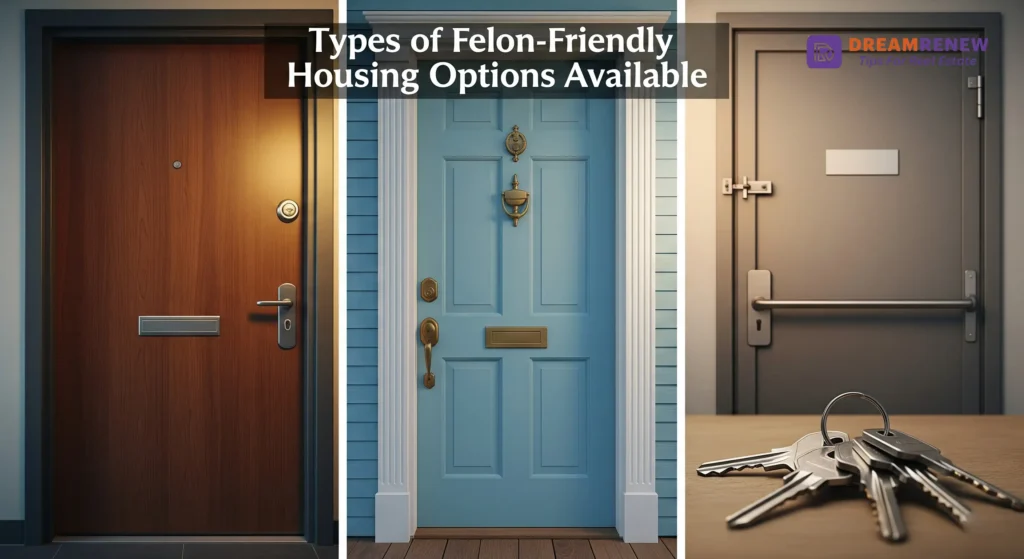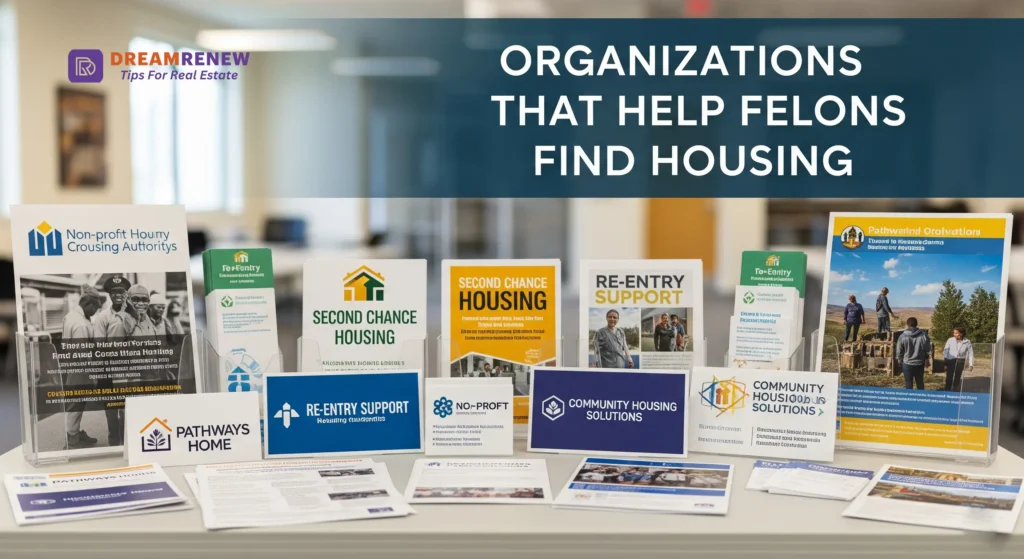Finding a place to live is tough for anyone, but if you have a felony on your record, it often feels like an uphill battle with no end in sight. The stigma alone is enough to shut doors before you even knock. Landlords fear potential liability, other tenants’ reactions, or simply have a policy that automatically disqualifies anyone with a criminal record. Then come the legal barriers — even though the Fair Housing Act prohibits discrimination based on race, color, religion, sex, or national origin, it doesn’t explicitly protect those with criminal records. Many landlords use background checks as a primary filter, and a felony conviction often becomes a red flag that overshadows everything else about you.
Public Housing Authorities Guideline
Public housing authorities (PHAs) also have strict guidelines regarding criminal backgrounds. Certain crimes, especially those related to drugs, sex offenses, or violent behavior, can lead to lifetime bans from federally assisted housing. Private landlords, on the other hand, have their own discretion. Some may have policies influenced by insurance companies that don’t cover properties rented to felons. This layer of systemic rejection can quickly lead to frustration and hopelessness for individuals seeking a fresh start.
The Importance of Stable Housing for Reintegration
Housing isn’t just a roof over your head—it’s the foundation of rebuilding your life. Without a stable address, everything becomes harder: securing a job, reconnecting with family, managing legal obligations, and accessing healthcare or social services. Studies consistently show that stable housing reduces recidivism. People with a permanent residence are far less likely to reoffend compared to those who are homeless or in unstable living situations.
Yet, paradoxically, the barriers to housing often push felons into cycles of instability. Couch-surfing, motels, or worse, living on the streets becomes the harsh reality. That’s why finding felon-friendly housing isn’t just about comfort; it’s a critical piece of reintegration into society. In 2025, as conversations about criminal justice reform grow louder, there is increasing attention on the need for inclusive housing solutions—but on an individual level, it still requires persistence, strategy, and knowledge of where to look.
Know Your Rights as a Renter with a Criminal Record

If you have a criminal record, then you must be aware of your rights in the United States.
The Fair Housing Act and Its Limitations
You might assume that laws like the Fair Housing Act (FHA) will protect you from rental discrimination. While the FHA is a powerful tool in fighting unjust discrimination, it doesn’t specifically cover criminal history as a protected category. However, there’s a gray area. The U.S. Department of Housing and Urban Development (HUD) has issued guidelines suggesting that blanket bans on renting to anyone with a criminal record can be considered discriminatory if they disproportionately impact certain racial or ethnic groups.
In 2025, these guidelines remain a pivotal point for legal arguments against unfair rental practices. If a landlord automatically rejects all applicants with felonies without considering the nature, age, or relevance of the offense, they could be violating HUD’s guidelines. Unfortunately, enforcing this is tricky; it requires awareness, documentation, and often legal assistance. Knowing how to navigate this is crucial for felons seeking housing.
State-Specific Laws That Protect Felons
Beyond federal laws, many states have introduced legislation that offers additional protections for individuals with criminal records. For example, states like California and Illinois have implemented “Ban the Box” policies that extend into housing applications, limiting when and how landlords can inquire about an applicant’s criminal history. Other states provide certain exemptions for non-violent or older convictions, making it illegal to deny housing based solely on those factors.
As these laws are state-specific, it’s vital to research the regulations in your particular area. In some places, municipal ordinances may provide more robust protections than state laws. Being informed can give you leverage when negotiating with landlords or disputing unfair rejections.
How to Handle Discrimination During the Rental Process
Discrimination can be subtle or blatant. You might never get a callback after disclosing your record, or you might be told flat out, “We don’t rent to felons.” Both scenarios are challenging but need to be handled strategically. Documenting every interaction with potential landlords is critical. Save emails, take notes of phone calls, and if possible, record verbal agreements or statements (where legally allowed).
If you believe you’ve been discriminated against, filing a complaint with HUD or a local fair housing agency is an option. While this route can be time-consuming, it can also pressure landlords to reconsider blanket policies. Another effective strategy is to counteract the stigma upfront by providing strong character references, proof of employment, and evidence of rehabilitation. The more you can humanize yourself and present as a reliable tenant, the better your chances of overcoming preconceived biases.
Types of Felon-Friendly Housing Options Available

There are several types of housing rental options available for individuals with felony convictions.
Transitional Housing Programs
Transitional housing serves as a bridge between incarceration and independent living. These programs often provide more than just a place to stay; they come with support services like job training, counseling, and life skills workshops. The duration of stay varies but typically ranges from six months to two years, depending on the program and individual progress.
In 2025, transitional housing remains one of the most accessible pathways for felons freshly out of prison. Organizations like The Fortune Society, Volunteers of America, and local reentry programs offer transitional housing solutions tailored to specific needs. While these are fantastic stepping stones, they’re not long-term solutions. But they provide a stable environment to save money, build a rental history, and ease back into daily life routines.
Private Landlords vs. Corporate Property Managers
When searching for felon-friendly housing, targeting private landlords is often more fruitful than applying to large corporate-managed properties. Private landlords usually have more flexibility and can make decisions based on personal judgment rather than rigid company policies. They may be more willing to overlook a criminal record if you can present yourself as a responsible tenant with stable income and positive references.
On the flip side, corporate property managers tend to follow strict background check protocols, leaving little room for negotiation. While this is not a universal rule, your odds are better with independent property owners, especially those advertising on platforms like Craigslist, Facebook Marketplace, or local classifieds.
Non-Profit and Faith-Based Housing Support
Many non-profit organizations and faith-based groups focus on assisting individuals with criminal backgrounds in securing housing. These organizations often partner with landlords who are open to renting to felons or operate their own housing facilities. Examples include Catholic Charities, Salvation Army housing programs, and local church initiatives that offer both emergency shelter and longer-term housing options.
The advantage of working with these organizations is that they understand the unique challenges you face and are often more compassionate and proactive in helping you find a stable living situation. Additionally, they might offer rent subsidies, utility assistance, or case management to ensure you stay on track.
How to Conduct an Effective Housing Search as a Felon

A few guidelines for effective housing searches for individuals with a felony record to help protect against scams.
Online Platforms That List Felon-Friendly Rentals
Gone are the days when felon-friendly housing was strictly found through word of mouth. In 2025, several websites cater specifically to helping individuals with criminal records find housing. Platforms like HelpForFelons.org, FelonyFriendlyHousing.com, and even niche Facebook groups have emerged as valuable resources.
While mainstream sites like Zillow or Apartments.com may not offer felon-specific filters, you can often find listings that explicitly mention “second chance” or “no background check.” Craigslist remains a goldmine for private landlord listings, but due diligence is essential to avoid scams.
Networking and Community Resources
One of the most underrated yet highly effective methods for finding felon-friendly housing is through networking and tapping into local community resources. It might sound old-school, but personal connections can open doors that online applications can’t. Start by connecting with reentry programs, local non-profits, community centers, and even job placement agencies that often collaborate with landlords willing to give second chances.
Support groups and local advocacy organizations are another goldmine. Many of them keep informal lists of landlords known for renting to individuals with criminal records. They also host workshops, housing fairs, or meetups where you can directly interact with property owners. Don’t underestimate the power of word-of-mouth referrals. A recommendation from someone within the community can vouch for your character and increase your chances of securing a rental.
Local community bulletin boards, libraries, and religious institutions often post housing opportunities that might not be advertised online. By engaging with these grassroots resources, you position yourself within a network that understands your challenges and is actively looking to assist.
Hiring a Reentry Housing Specialist
If you’re feeling overwhelmed by the process, hiring a reentry housing specialist can make a world of difference. These professionals specialize in helping individuals with criminal backgrounds find suitable housing. They are well-versed in local laws, have established relationships with felon-friendly landlords, and can guide you through paperwork, applications, and appeals if you’re denied housing.
In 2025, many non-profits and government-funded programs offer these specialists for free or at a subsidized cost. Some specialists work directly within halfway houses or reentry programs, while others operate independently. They can help craft your rental applications, prepare you for landlord interviews, and even advocate on your behalf if discrimination arises.
Investing time into working with a reentry specialist not only streamlines your housing search but also equips you with strategies for long-term housing stability. They’re like having a personal coach who knows all the shortcuts and pitfalls of the rental world for felons.
Organizations That Help Felons Find Housing
Here we discuss a few organizations that help felons find a house for rent or living

National Reentry Programs
National organizations like The Fortune Society, Prison Fellowship, and the National Reentry Resource Center specialize in helping individuals reintegrate into society after incarceration. These groups often provide housing assistance or have partnerships with landlords who accept tenants with criminal records. They also offer job placement, legal assistance, and mentoring programs, making them a one-stop-shop for reentry needs.
Local Community Initiatives
Beyond national programs, many cities have local initiatives specifically designed to support reentry populations. For example, city-funded programs may offer housing vouchers, subsidized rental units, or reentry navigation services. These local efforts are often more tailored to the unique challenges within a specific region, making them highly effective.
Checking with your city’s housing authority, community action agencies, or local reentry task forces can uncover valuable housing resources. Often, these programs aren’t heavily advertised, so proactive outreach is necessary.
Faith-Based Outreach Housing Services
Faith-based organizations are often at the frontline of providing felon-friendly housing. Churches, mosques, synagogues, and affiliated charities understand the importance of second chances and often manage housing programs that don’t discriminate based on criminal history.
Programs like Catholic Charities, The Salvation Army, and local faith communities offer transitional housing, emergency shelter, and even long-term rental support. They can also connect you with supportive services like counseling, job readiness programs, and mentorship, which further aid your journey to stable, independent living.
Financial Assistance Programs for Felons
It is essential to be aware of financial assistance programs if you are a felon.

Housing Vouchers and Subsidies
Programs like Section 8 Housing Choice Vouchers are designed to assist low-income individuals, including those with criminal records, in affording rental housing. While certain felonies might disqualify you (such as lifetime sex offender registrants), many individuals with non-violent or older convictions still qualify.
In addition, some cities offer special voucher programs targeted specifically at the reentry population. Getting on these waiting lists early is crucial, as demand often exceeds supply.
Emergency Rental Assistance Programs
Unexpected financial hardships can derail your housing efforts. Emergency rental assistance programs provide one-time funds to cover security deposits, first month’s rent, or overdue rent to prevent eviction. Many non-profits, city governments, and faith-based organizations administer these funds.
Keep an eye on local community announcements, as these programs are often time-sensitive and operate on a first-come, first-served basis.
Grants for Reentry Support
Some foundations and charitable organizations offer grants to support individuals transitioning from incarceration. These funds can be used for housing, transportation, education, or job training. While these grants may not be advertised widely, contacting reentry programs or legal aid services can connect you to available opportunities.
Long-Term Housing Solutions for Felons

Here are a few solutions for a long-term basis that can help you find a house for rent.
Rent-to-Own Programs
Rent-to-own agreements can be a great long-term solution. These arrangements allow you to rent a property with the option to buy it later. Over time, part of your rent goes toward the purchase price. Private sellers are often more flexible with background checks in rent-to-own deals, giving you the opportunity to build equity and eventually become a homeowner.
Affordable Housing Projects
Affordable housing developments, funded by federal, state, or local initiatives, are designed to provide low-cost housing options for individuals with limited income. While background checks are standard, these programs often have more lenient policies regarding older, non-violent felonies.
Stay connected with your city’s housing authority to learn about upcoming affordable housing projects and application deadlines.
Building a Positive Rental History
Every positive rental experience counts. If you can secure a short-term lease or sublease, use it as a stepping stone. Pay rent on time, maintain the property, and get a positive reference when you move out. A solid rental history becomes your most powerful asset for future applications, gradually reducing the weight of your criminal record in landlords’ eyes.
Conclusion
Finding felon-friendly housing for rent in 2025 is challenging, but it’s far from impossible. The path to stable housing requires persistence, strategy, and leveraging every available resource. From knowing your rights and preparing a strong rental resume to networking with community organizations and exploring financial assistance programs, there are actionable steps you can take to overcome the barriers.
Remember, every “no” gets you closer to a “yes.” The stigma around felony convictions is slowly shifting, and more landlords are becoming open to giving second chances. Equip yourself with knowledge, stay persistent, and don’t be afraid to ask for help. Your home is out there—you just have to keep knocking until the right door opens.
Frequently Asked Questions About Felons
Can a landlord legally deny me housing because of my felony?
While landlords can consider criminal history, blanket bans without considering the nature or timing of the offense may violate HUD guidelines, especially if it disproportionately impacts certain protected classes.
Do transitional housing programs charge rent?
Many transitional housing programs charge reduced rent or base it on your income. Some offer free accommodation for a limited time while providing support services.
What is a rental resume, and do I really need one?
A rental resume is a document that outlines your rental history, employment, references, and personal background. It helps present you as a professional, organized, and responsible tenant—crucial when overcoming a criminal record stigma.
Are there landlords who don’t run background checks?
Yes, some private landlords, especially those advertising on Craigslist or Facebook Marketplace, may skip formal background checks. However, always be cautious and verify the legitimacy of listings to avoid scams.




